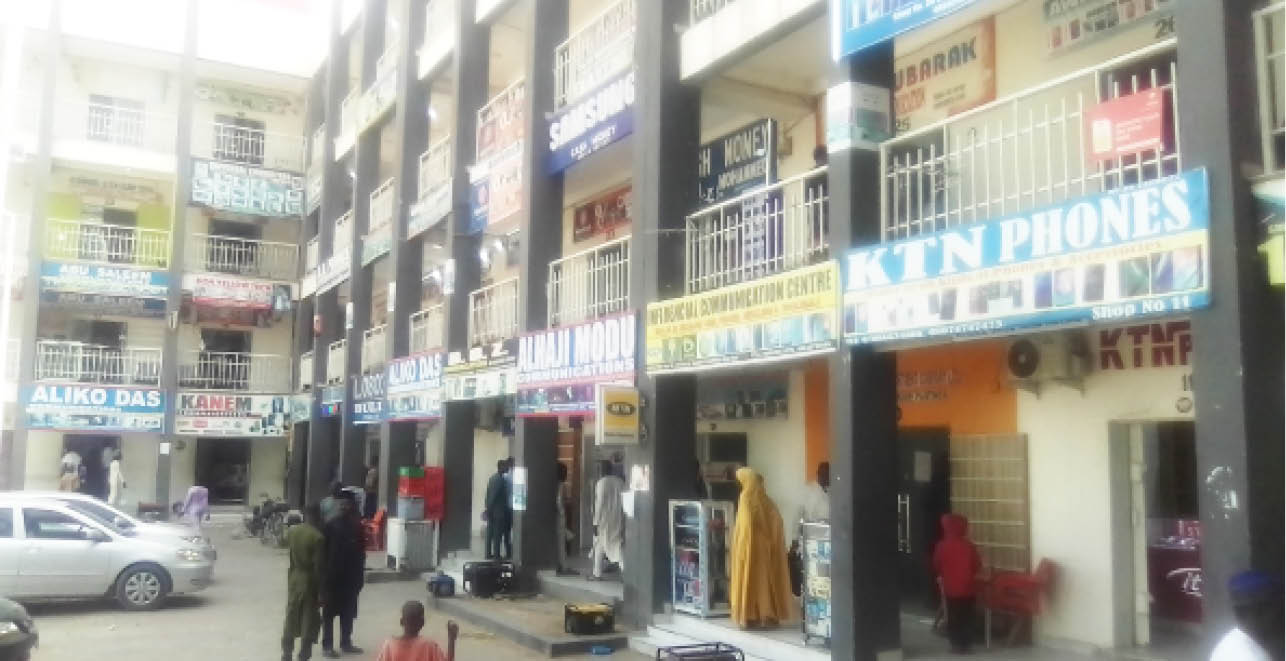Maiduguri mobile phone market was previously located at the Post Office area where retail traders rented shops and sold phones and accessories while many other outlets were meant for phone repairs. But lack of inadequate spaces due to poor planning, which led to overcrowding at the marketplace and traffic congestion along the adjoining streets, prompted the authorities to build shops in a different location and relocate businesses there.
“State authorities appealed to us in 2019 to leave our former shops and relocate to Bulunkutu area where enough shops, including a three-storey building, were built by the government. Then, we were told that retailers will be given every support to boost their businesses,” Vice Chairman, Borno GSM Market Association, Abba Adam Shabab, told Daily Trust.
- PHOTOS: Police occupy Lekki tollgate to prevent protesters from reassembling
- #OccupyLekkiTollGate: Drama As Officials Are Forced To Push Van Conveying Arrested Protesters
Some phone sellers were reluctant to relocate to the new shops he said, because of fear of losing most of their clients and a number of unforeseen conditions. Eventually, traders were happy with the decision because those who had no shops in the previous area were given shops and show glasses while the environment was expansive, he added.

“Most of the prominent customers who were unable to do businesses in the old market with just over 300 shops, find the new market, with over a thousand shops, more convenient. We have three sections here consisting of the three storey-building called black and white, red bricks and the open space,” he said.
Many of the retailers said the amount of money being paid to the state authorities as rent per shop per annum differed. In black and white section for instance, retailers on the ground floor were expected to pay N235, 000 a year, the first floor N180,000, second floor between N160,000 and N100,000 while the last floor was N80,000. The sum of N120,000 was paid per shop in the red bricks market.
“The shops we left at the Post Office were owned by individuals and less expensive and contrary to our expectations, these ones built by the government are inflated. We paid N40, 000 for single shops and N80, 000 for double in the former market. Traders in the black and white building should at least pay N100, 000 while those in red bricks should pay N60, 000. In the open space, shops should cost N40,000,” one retailer said.
The major items sold at the phone market included mobile phones and accessories, laptops and tablets; there were mobile phone technicians who repaired phones, according to a phone dealer, adding that the market offered job opportunities for hundreds of youths.
This corroborated the assertion of the vice chairman that lots of youths who ventured into phone businesses in the market were lifted out of poverty, and so called on the state government to support small scale business owners.
“Government should support us with business grants because a greater part of the people doing business here are youths who are industrious and promising,” he said.
He further said the retailers have in several instances pleaded with authorities to review the rent per shop but to no avail.”
There are technicians in the market who have several trainees under them learning to repair phones, computers and the like, but the association wants the state government to set up a training centre in the form of a vocational school in the market.
“This is because after each training period, the government will be able take the record of the trainees and give them certificates and possibly assist them with tools and grants. We have a multipurpose hall and enough space to build the centre,” he said.
On how the retailers joined the phone market supply chain, the vice chairman said there were dealers in Kano and Lagos who bought products from companies or their salespeople abroad and in turn distributed the same to vendors and merchants.
He said “Most companies have outlets in major cities including Maiduguri where faulty devices could be fixed. There are companies that do not have repair outlets in this country and whenever there is a major fault with their products, the devices will be returned to the dealers who will convey them to the company to fix.”
The association struggled to protect and advance the economic interest of its members and safeguard their wellbeing as well as discouraged them from breaking the law. Retailers were only allowed to buy and sell new products; where necessary, second hand items with original receipts could be accepted, Shabab said.
“Thankfully, there are laws guiding the conduct of our members who are expected to abide by the provisions of the constitution. We have lawyers who handle genuine cases involving our members but we do not entertain complaints from any member who violates our law, including those who obtain suspicious second-hand products without receipts. There are criminal penalties attached to stolen goods,” he said.
In view of the fact that the supply of electricity is erratic in most rural communities and indeed Maiduguri, users are advised to rely on phones with best battery life.
“There are so many options available in buying cell phones and if you are living in places where power supply is not constant you have to look for phones with best battery life. There are new products in the market that have 4000 to 6000mAh which will last well over a day, depending on usage,” he said.
Several business owners in the GSM market were said to have faced the problem of lack of working capital due to inability to access loans from the government or borrow from other financial sources, Shabab said, adding that most businesses have either failed or are at the verge of collapse due to poor cash flow.
“There are many reasons why many small businesses here fail but the most prominent since we relocated to the new market is lack of capital. Again, without enough capital or assets, retailers are not likely to attract financial lenders or funding.
“Authorities have earlier pledged to link us with the Bank of Industry, at least to borrow money but nothing was done. We expect the government to come to our aid and boost our businesses,” he said.
He said most of the businesses at the GSM market are owned and managed by young people, and called on the government to put in place appropriate security systems at the market.

 Join Daily Trust WhatsApp Community For Quick Access To News and Happenings Around You.
Join Daily Trust WhatsApp Community For Quick Access To News and Happenings Around You.

